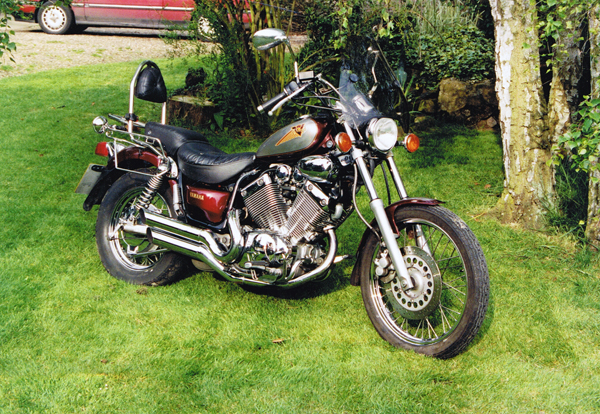
ADVICE TO NEW WRITERS
"writing" < noun>
1) The activity or skill of writing.
2) Written work, especially with regard to its style or quality.
- Oxford Concise Dictionary
I can only advise about the creation of novels. If you want to write a novel, first consider the obligation of your time. It can take years. The end of the book is such long a distance away 'over the horizon' that it can't be seen. It is easy to underestimate that level of commitment, and many people shelve their projects when they do. Personally, I find the length of time involved reassuring. I began on a little blue type-writer when I was eighteen. It was dire, but I knew I would improve and it made me feel special, like I was moulding myself into the author I wanted to become.
I am not a 'morning person' and at my parents' between 1989 and 1993, during stretches of lucidity between bouts of mental illness, I used to sit up writing late into the night. My dad worked from home, and he said: "If you want to be a writer, you get up at eight o'clock, start work at nine, and finish at five - just like me." To this irrelevant comparison between art and insurance broking I responded that you can't just switch creativity on and off like a magic button. But, later in life, I discovered that I could do exactly that. I fight through that first half hour of foggy apathy, and I can access my artistry by force. It is ironic that I wound up working at a desk like my father, anyway, but he was right about routine. It is a signal of professionalism. Authors have to write to dead-lines all the time!
I will begin with the recall necessary for auto-biography. I frequented cafés three or four times a week whilst writing "Defender", and it was nice to get out of the house. I like the 'bohemian' thing, and wrote the entire first draft on A5 letter paper. I had the delusion that it could be published as a page-by-page reproduction of my hand-writing, which was impossible, but if I hadn't used a pen when the experiences were still fresh I wouldn't have remembered half of what happened. I advise that you begin with a note-book. Write down everything you can remember - chronologically - and as quickly as possible. Concentrate on memory. Once everything is annotated, roll the first sheet of paper into your type-writer or open the computer file containing 'Chapter One'. Now enjoy making your content stylish. It will come out differently to your notes, but this evolution is a pleasure and sometimes you will be able to cut and paste whole sections of your notes into the final manuscript.
What about the techniques of fiction? Some pessimists say there is nothing original left, but I do have innovative ideas, usually a progression of existing concepts, nevertheless original. Some must be recorded immediately or they disappear like dreams upon waking. Always have ready a method of storing ideas. A novel is about thirty chapters long, so take a piece of paper and write 1 - 30 down the left hand margin. A plot can be so tangible you may feel it unnecessary to make notes but doing so will clarify what is to come. Begin the story with a crisis, what is known as a 'narrative hook', to draw in the reader. Write about what you know. And don't make life easy for your characters. You have the solutions to every obstacle in their path but the reader needs to be kept guessing!
For me raw material comes from a mysterious 'zone' of thought where music is distracting. It is as if a part of me is no longer in the room, like my metabolism slows down and time passes by faster. I glance at my wrist watch and one hour has gone by in what seemed like twenty minutes. Musical lyrics reduce my application because a large part of me cannot help but listen to it, so I am pulled back into "normal time". In a purely business sense, writing and music have 'back catalogues' in common. If someone likes a CD they could buy other discs by the same band. Or paperbacks. Get into your 'zone'. If you cannot force your artistry you must take absolute advantage of the creative moment. Strike while the iron is hot. With the exception of emergences, or duties promised to family, all other priorities should be rescinded.
Editing is a different process. I have created my own system of changing words, and moving sentences around. Some say that if a book has been redrafted too much it looses its original essence. You have to know when to stop. Every time I go over the work there are fewer alterations and, when there are none left, I add the mint page to the manuscript. Later in life, when you have exhausted all your own experiences, you will have to rely on research.
The Web is the biggest data-base in human history. Writers can 'Google' everything to reinforce the believability of a story, but sometimes live involvement is needed when the information cannot be adequately imagined. The climax of your book can change. You can't make the personalities you have created act out of character. If the end is unexpected, different to what you had plotted at the outset, it will be doubly surprising for your readers! The patience and consistency continues to the last word. Take a long break then re-channel your aimlessness into post-production. Your last draft will show stylistic repetitions because it took so long to write. Enjoy applying logical progression, and erasing your own clichés! Introduce double spacing. Do a Microsoft Office grammar and spelling check, and a word-count. Then prepare a short but brilliant synopsis.
When hunting for publishers I use "The Writer's & Artist's Yearbook", a list of what material the houses are looking for and how to contact them. Many prefer submissions as an e-mail attachment, others won't open e-mails at all. You are up against tough competition. Publishers receive hundreds of submissions a week. Send covering letters to the houses you are not sure about. It will save time. A perfect template letter and a good short synopsis will increase the chance of an editor asking for more. Canvas every single house that may show even the vaguest interest. If you don't get picked up, don't let that prevent you planning your next book. I had been writing intermittently since 1988 and I wasn't published until 1st January 2007! A few of those intervening years were spent stoned, or psychotic, nevertheless that is undeniably a long time.
In one rejection an editor wrote: "The belief there is a vast untapped talent out there is a delusion. If your work is good enough you will have no difficulty getting published." Yet I wondered: did he get out of bed the wrong side that morning? Was he hung-over? Did he have a row with his wife before he left for work? And why did JK Rowling get rejected over twenty times before earning half of one billion pounds for 'Harry Potter'? Luck is a factor, but I agree with the second sentence of that editor's opinion. He was half right, yet he didn't discuss how you achieve the standard. You need an inherent belief in yourself. If you've got one ounce of talent, and you put the work in long enough, even for many years, you can achieve your ambition. There are as many opinions as there are editors. You can become that artist!






